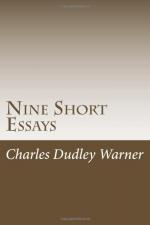Truthfulness is a quality that needs to be as strongly insisted on in literature as simplicity. But when we carry the matter a step further, we see that there cannot be truthfulness about life without knowledge. The world is full of novels, and their number daily increases, written without any sense of responsibility, and with very little experience, which are full of false views of human nature and of society. We can almost always tell in a fiction when the writer passes the boundary of his own experience and observation—he becomes unreal, which is another name for untruthful. And there is an absence of sincerity in such work. There seems to be a prevailing impression that any one can write a story. But it scarcely need be said that literature is an art, like painting and music, and that one may have knowledge of life and perfect sincerity, and yet be unable to produce a good, truthful piece of literature, or to compose a piece of music, or to paint a picture.
Truthfulness is in no way opposed to invention or to the exercise of the imagination. When we say that the writer needs experience, we do not mean to intimate that his invention of character or plot should be literally limited to a person he has known, or to an incident that has occurred, but that they should be true to his experience. The writer may create an ideally perfect character, or an ideally bad character, and he may try him by a set of circumstances and events never before combined, and this creation may be so romantic as to go beyond the experience of any reader, that is to say, wholly imaginary (like a composed landscape which has no counterpart in any one view of a natural landscape), and yet it may be so consistent in itself, so true to an idea or an aspiration or a hope, that it will have the element of truthfulness and subserve a very high purpose. It may actually be truer to our sense of verity to life than an array of undeniable, naked facts set down without art and without imagination.
The difficulty of telling the truth in literature is about as great as it is in real life. We know how nearly impossible it is for one person to convey to another a correct impression of a third person. He may describe the features, the manner, mention certain traits and sayings, all literally true, but absolutely misleading as to the total impression. And this is the reason why extreme, unrelieved realism is apt to give a false impression of persons and scenes. One can hardly help having a whimsical notion occasionally, seeing the miscarriages even in our own attempts at truthfulness, that it absolutely exists only in the imagination.




